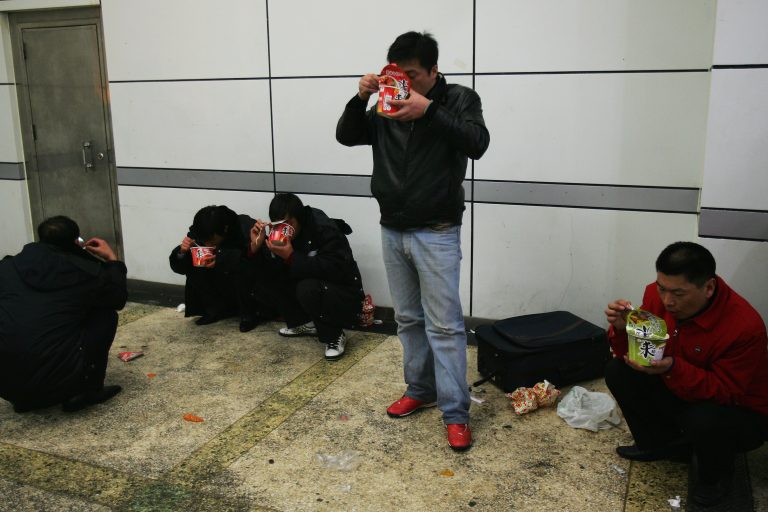According to various Chinese-language media reports, authorities in the county of Binhai, Jiangsu Province, have conducted a drive to root out a supposed trend of civil servants “lying flat.”
Seven officials have been admonished so far in the action, which has sparked a furor of online discussion, including many comments mocking the authorities’ efforts as futile or misguided.
“Lying flat,” or tang ping (躺平) in Mandarin, gained popularity as an online trend in 2021. It refers to people, especially the youth, who largely forego career and life ambitions in favor of a minimalist existence rather than subject themselves to China’s highly competitive — and personally taxing — professional sector.
READ MORE:
- More Cities Go Under Lockdown as China Reports 1,456 ‘High’ and ‘Medium-risk’ Zones
- China’s Epidemic Prevention Staff Getting Heatstroke From Sweltering Temperatures as Casualties Rise
- Asia’s Wealthiest Woman Loses $12 Billion in China’s Real Estate Crisis
- Chinese Protesting Frozen Bank Accounts Just the Tip of the Iceberg in Beijing’s Widening Financial Crisis
The action in Jiangsu, which lies in eastern China next to Shanghai, is directed at “grassroots officials in the relevant work units.” According to the Hong Kong-based Phoenix Network, Wang Dawei of Binhai’s Communist Party branch Organization Department gave a “focused talk” to the batch of seven found to be “lying flat.”
Wang claimed that the seven were determined to be “lying flat” based on a number of metrics, including “popular election” (i.e. polls among coworkers), “unit evaluation,” and “organizational assessment.”
Success
You are now signed up for our newsletter
Success
Check your email to complete sign up
Those labeled as “lying flat”-ers were encouraged to offer both verbal and written in-depth “self-criticisms.” Persons “elected” with more than 20 percent of their coworkers’ votes were given “warning talks” by the leading cadres, while those with a lesser portion of votes had the results relayed to the leadership and themselves. Individuals deemed “unrepentant” are to be “dealt with according to the seriousness of the situation,” with a six-month “management period” stipulated as a follow-up measure.
Netizens ambivalent
The news has received a significant volume of online traffic, with Chinese internet users offering their views on the action by Binhai county’s Communist Party branch.
Some comments directly lambasted the officialdom. One reads: “This is an empty and energy-wasting performance. When you enter the [government] system you’re in the safety box, of course you’re going to ‘lie flat.’”
Another accused the authorities of engaging in “formalism” and said the elective labeling of individuals as “lying flat” was “little more than a tool for vengeance” in the workplace.
- In Leaked Recording, Elite Chinese Scholar Laments Crippling Dysfunction of Communist Regime
- Shanghai Man Left Homeless After Being Confined to COVID Quarantine Camp for 42 Days
- ‘Unified National Market’ Push Exposes Steep Challenge of Reforming China’s Economy
- Behind the Timing of Didi Global’s $1.2-billion Fine
Moreover, the comment reads, the government is confused about what “lying flat” really means: “Whether or not someone decides to ‘lie flat’ is their own business, are you going to stop someone from taking a rest when they get tired? If they’ve gotten their work done they’re not breaking any rules.”
Another netizen spelled it out more plainly: “You can’t use the words ‘lying flat’ in relation to government officials, they’re not worthy of the term. What they’re doing is dereliction of duty, official inaction [不作為]! They keep their iron rice bowls [guaranteed employment even when us commoners suffer] drought and floods! How on earth does that count as ‘lying flat?’”
‘Lying flat’-ism
The popularity of ‘lying flat’ comes in large part from the massive pressures placed on many Chinese youth in recent generations to live up to high — often unrealistic — expectations in their academics, career, and social achievement.
Such pressure comes not just from modern Chinese society, but also the Chinese Communist Party (CCP), which is keen on maintaining rapid economic growth and more recently, reversing a demographic collapse.
Proponents of “lying flat” reject these expectations, with many self-identified “lying flat”-ers renouncing marriage, home ownership, children, or full-time employment.
In many parts of China, men looking to marry are expected to hold a well-salaried job, own a home, and pay a steep “bride price” for their would-be in-laws before they can tie the knot.
Complicating matters, while the number of Chinese university graduates has increased greatly, many students fall into the trap of being “unemployed right after graduation” (畢業即失業), finding themselves unable to compete for the few available jobs.
Some netizens commenting on the situation in Jiangsu noted the vagaries of the Binhai authorities’ campaign; some even compared it to the political persecutions meted out to Party officials during the Cultural Revolution.
“How is ‘lying flat’ determined?” one user asked. “Does not working overtime count? Cracking down without a clear standard is basically just petty crime [by the government]!”
Another user encouraged the officials to simply focus on their jobs: “Less of these formalities, and more real work.”
Li Muzi contributed to this report.















